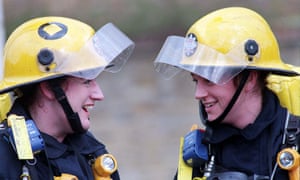As a female firefighter, I've had to tackle sexism as well as fires
When I joined the fire service, the lack of facilities for women was a shock. That’s changed, but too many girls still see firefighting as a man’s job
When I left school I thought about joining the army or police, but not the fire service. Like many women, I thought the fire service seemed far more for men. At the age of 31, after working in creative industries, I finally joined the London fire brigade. I’m now a deputy assistant commissioner.
I was drawn to the teamwork, the physical fitness and how wide-ranging the role was. Some may see the job as just squirting water on hot stuff, but it’s so much more. The flexibility of the shifts appealed to me; it’s very positive for anyone who doesn’t want a nine-to-five office job.
When I joined in 2002, the biggest barrier was the lack of facilities at fire stations. In the early 90s, the push to recruit women was little more than window dressing as fire stations simply weren’t ready to accommodate us. No locks on rooms and a lack of shower and toilet facilities for women. When a station did have them, they could accommodate only one woman at a time.
Since then, facilities have greatly improved. And I’ve never had any major negative experiences with my colleagues about being a woman and a firefighter. Probably the worst I got was the colleague who said they didn’t agree with women in the job, but told me: “You’re alright.”
Reaching out to under-represented groups is key to spreading the message that this is a career for everyone and bringing in the next generation of firefighters. When I visit schools I find it sad that so many young girls see it as a job for men. I see myself as a role model who can encourage all women that nothing is out of their reach.
Just because we want more female firefighters does not mean we’re lowering our standards or preventing men from joining. Myths like these need busting. We want to broaden the net as wide as possible; accepting difference and diversity at all levels will make us a better fire service and better reflect the city we serve.
We should also remember that female firefighters are nothing new in the capital. In 1941, London’s auxiliary fire service was commended for the bravery of its firefighters, who delivered petrol to fire pumps around Bermondsey while the docks were being bombed during one of the worst nights of the Blitz. As one of them said: “You don’t think about it – the things happening when the fires were going. You could hear the bombers, but you just got on with it.”
That quote is by Gillian Wilton-Clark, who received the George medal for her services. Her story and the role women have played in the history of London’s fire service are part of an exhibition at our pop-up museum in Lambeth throughout March.
Nearly 80 years on, female firefighters are still comparatively rare and their achievements mainly overlooked by the media, which still talk about firemen rather than firefighters – something the London brigade changed 30 years ago. Our #FirefightingSexism campaign, launched last year, has got people talking about how they describe fire service staff. Things won’t change overnight, but it is a step in the right direction and something welcomed by fire and rescue services across the country.
On International Women’s Day on 8 March, firefighter recruitment opens in London. Joining the service changed my life. I’ve moved from my first job in Millwall fire station to becoming, from 1 March, the brigade’s head of cultural change and talent. I can’t recommend it enough.

No comments:
Post a Comment